Today Current Affairs: 1st March 2022 for UPSC IAS exams, State PSC exams, SSC CGL, State SSC, RRB, Railways, Banking Exam & IBPS, etc
Table of Contents
International Space Station (ISS):

A widely circulated comment by the chief of Russian space agency Dimitry Rogozin has ignited fears that the tension following Russia’s invasion of Ukraine could have consequences for the International Space Station (ISS).
- He said that Russia could respond to the US sanctions by letting the ISS fall from space. He said the ISS could drop over US or Europe, or over India and China. Its orbital flight path usually does not take it over most of the Russian territory.
- The International Space Station is the only operational space laboratory as of now, orbiting the earth in a trajectory that is about 400 km above the land surface.
- It is operated by more than 15 partner countries. Apart from Russia and the United States, Canada, Japan and several members of the European Space Agency are partners in the ISS.
- The football-field-sized ISS travels at a speed of about 28,000 km per hour. It completes one journey around the earth in about one and a half hours. In one day, therefore, it makes about 16 trips around the world.
- The ISS is not the first space station to be built and operated. Several smaller space stations have been used earlier, the most famous of which have been the Russian Mir space station that operated in the 1980s, and the American Skylab.
- The ISS has been in operation since 1998 and is expected to continue at least till 2028. Russia, however, has indicated that it might pull out of the collaboration earlier, possibly by 2024.
Member Of The Economic Advisory Council To The Prime Minister (EAC-PM): Sanjeev Sanyal
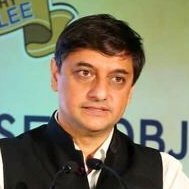
After five years as the Principal Economic Adviser to the Ministry of Finance, Sanjeev Sanyal has now been appointed as a full-time member of the Economic Advisory Council to the Prime Minister (EAC-PM).
- The incoming member is a noted economist, author and columnist, and brings his nearly two decades of experience in the financial sector to the table.
- Prior to his stint in the Finance Ministry, Mr. Sanyal was the Global Strategist and Managing Director at Deutsche Bank until 2015.
- Sanyal was instrumental in the preparation and publishing of the Economic Survey (2021-22).
- He is credited with the transitioning of the Economic Survey from the previous two-volume format to a single volume format alongside a separate volume for statistical tables.
Economic Advisory Council to the Prime Minister (EAC-PM)
- It is a non-constitutional, non-permanent and independent body constituted to give advice on economic and related issues to the Government of India, specifically to the Prime Minister.
- At present, EAC-PM is chaired by Dr. Bibek Debroy (Chairman).
Advanced Medium Combat Aircraft (AMCA):
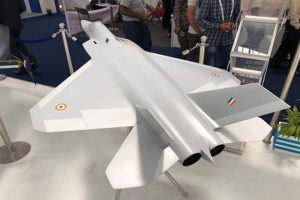
India and France are close to concluding a deal, likely in the next couple of months, for the joint development of a 125KN engine for the indigenous fifth generation Advanced Medium Combat Aircraft (AMCA) under development.
- The collaboration is between the Defence Research and Development Organisation (DRDO) and French engine maker Safran.
- External Affairs Minister S. Jaishankar discussed this issue with French Defence Minister Florence Parly during his visit to Paris.
- Last year, the government had informed Parliament that it is proposed to develop indigenous engines for powering aircraft such as the Light Combat Aircraft (LCA) variants and AMCA in association with an international engine house.
- The initial design of the AMCA started way back in 2009 and is envisaged as a twin engine stealth aircraft with internal weapons bay , which has been developed for the first time and for which the design is complete, as reported by The Hindu earlier.
- The manufacturing and production of the aircraft is planned through a Special Purpose Vehicle, which will also involve private industry.
Immigration Visa Foreigners Registration Tracking (IVFRT) Scheme:
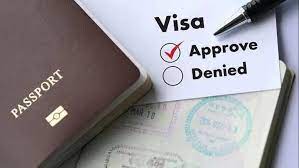
The Government has approved the continuation of the Immigration Visa Foreigners Registration Tracking (IVFRT) Scheme for a period till 31st March 2026 with a financial outlay of Rs.1,364.88 crore.
- It seeks to interlink and optimise functions relating to immigration, visa issuance, registration of foreigners and tracking of their movements in the country.
- Its core objective is modernisation and upgradation of immigration and visa services.
- It has been identified and included as one of the Mission Mode Projects to be undertaken by the Ministry of Home Affairs under the National e-Governance Plan (NeGP).
- Currently, it covers 192 Indian missions across the globe, 108 Immigration Check Posts in India, 12 Foreigners Regional Registration Officers and offices and more than 700 Foreigners Registration Officers, Superintendents of Police/Deputy Commissioners of Police across the country.
- After the commencement of IVFRT, the number of visa and Overseas Citizen of India cards issued increased from 44.43 lakh in 2014 to 64.59 lakh in 2019 at a Compounded Annual Growth Rate (CAGR) of 7.7%.
Rashtriya Vayoshri Yojana:

The MInistry of Social Justice and Empowerment will distribute 4,800 daily living aids and assistive devices among 895 senior citizen beneficiaries under Rashtriya Vayoshri Yojana (RVY).
- Rashtriya Vayoshree Yojana was launched in 2017 by the Ministry of Social Justice and Empowerment.
- It is a central sector scheme funded from the Senior Citizens’ Welfare Fund. The fund was notified in the year 2016.
- All unclaimed amounts from small savings accounts, PPF and EPF are transferred to this fund.
- It aims to provide aids and assistive living devices to senior citizens belonging to Below Poverty Line (BPL) category who suffer from age-related disabilities such as low vision, hearing impairment, loss of teeth and locomotor disabilities.
- The aids and assistive devices, viz walking sticks, elbow crutches, walkers/crutches, tripods/quad pods, hearing aids, wheelchairs, artificial dentures and spectacles are provided to eligible beneficiaries.
- As per the Census figures of 2011, the population of senior citizens in India is 10.38 crore. More than 70% of the population of senior citizens live in rural areas of the country. A sizeable percentage (5.2%) of the senior citizens suffers from some sort of disabilities related to old age.
- The Scheme is being implemented by the Artificial Limbs Manufacturing Corporation (ALIMCO), a PSU (Public Sector Undertaking) under the Ministry of Social Justice and Empowerment.
Veer Savarkar:

The Prime Minister has paid tributes to freedom fighter Veer Savarkar on his Punya tithi (26th February).
- Veer Savarkar was Born on 28th May,1883 in Bhagur, a village near Nashik in Maharashtra.
- He Founded a secret society called Abhinav Bharat Society.
- He Went to the United Kingdom and was involved with organizations such as India House and the Free India Society.
- He was the president of Hindu Mahasabha from 1937 to 1943.
- Savarkar wrote a book titled ‘The History of the War of Indian Independence’ in which he wrote about the guerilla warfare tricks used in 1857 Sepoy Mutiny.
- He also wrote the book ‘Hindutva: who is hindu?’.
- He was Arrested in 1909 on charges of plotting an armed revolt against the Morley-Minto reform (Indian Councils Act 1909).
- Arrested in 1910 for his connections with the revolutionary group India House.
- One of the charges on Savarkar was abetment to murder of Nashik Collector Jackson and the second was waging a conspiracy under Indian Penal Code 121-A against the King emperor.
- Following the two trials, Savarkar was convicted and sentenced to 50-years imprisonment also known as Kala Pani and transported in 1911 to the Cellular Jail in the Andaman and Nicobar Islands.
- Death: He died on 26th February 1966 due to fasting on his own wish of death.
Operation Ganga:

The Government of India has launched a ‘multi-pronged’ initiative named ‘Operation Ganga’.
- A dedicated Twitter handle ‘OpGanga Helpline’ to assist Indian evacuation from Ukraine has also been announced.
- The tensions between Russia and Ukraine are currently heightened, with war erupting in Ukraine after the Russian military launched a series of attacks recently.
- Operation Ganga is an evacuation mission to bring back all the Indian nationals who are currently stranded in Ukraine.
- There were around 20,000 Indians including students stuck in Ukraine.
- Till now, three Air India flights have been able to bring back more than 900 Indians from Ukraine to India.
- The Indian evacuation flights are operating from neighbouring countries like Romania and Hungary.
- The government is also facilitating evacuation of stranded Indians from its borders crossing Romania, Hungary, Poland and Slovakia.
World NGO Day:

Every year, 27th February is observed as the World NGO day all over the world.
- India has over three million Non-Governmental Organisations (NGO) that work across a range of arenas and play important roles of facilitator, catalyst or partner in bringing social transformation.
- The day assumed its official status when 12-member countries of the IX Baltic Sea NGO Forum on 17th April 2010 formally recognised it.
- In 2012, the forum’s Final Statement Resolution adopted the day.
- Although the day was recognised officially in 2010, it was only in 2014, that for the first time World NGO Day was observed by the United Nations.
- The main man behind this day was Marcis Liors Skadmanis, an UK-based social entrepreneur, who inaugurated the 2014 World NGO Day.
- The day was conceived to spread awareness of the tremendous contributions of NGOs all around the world and honour the relentless efforts of the social workers both in the public and private sectors.
Russian Banks Excluded From SWIFT:

In a move to counter Russia’s war over Ukraine, the US and the European Commission issued a joint statement to exclude some Russian banks from the Society for Worldwide Interbank Financial Telecommunication (SWIFT) messaging system.
- The intention behind this action is to further isolate Russia from the international financial system.
- The move against Russia is only partly implemented for now, with only some Russian banks being covered.
- The option of expanding it further to a pan-country ban is something that the US and its allies are holding back as a further escalatory move.
- SWIFT provides the trusted messaging platform that enables financial institutions to exchange information about global monetary transactions such as money transfers.
- While SWIFT does not actually move money, it operates as a middleman to verify information of transactions by providing secure financial messaging services to more than 11,000 banks in over 200 countries.
- Most of the world trade takes place with financial messaging passing through SWIFT.
- It was established in 1973 and is based in Belgium.
- It is overseen by the central banks from eleven industrial countries: Canada, France, Germany, Italy, Japan, the Netherlands, Sweden, Switzerland, the United Kingdom, and the United States, besides Belgium.
- India’s financial system has access to the SWIFT.
- Prior to SWIFT, the only reliable means of message confirmation for international funds transfer was Telex.
- It was discontinued due to a range of issues such as low speed, security concerns, and a free message format.
Armed Forces Preparatory School:

The Armed Forces Preparatory School is part of the projects announced by the Delhi government in its 2021 ‘Deshbhakti Budget’.
- Aim: In helping students prepare for entry into the National Defence Academy and other services.
- It will be the first fully residential school set up by the Delhi government.
- Eligibility: The school will be from Class IX to XII and admissions will be conducted for 100 students in each class. Of these, 60 will be boys and 40 will be girls in each grade.
- The school will have an academic wing and a ‘service preparatory’ wing.
- The services preparatory wing is aimed at “nurturing the identified potential and improving on the identified gaps/working areas” and inculcating “officer-like qualities” in the students
The ‘Scheduled Tribes And Other Traditional Forest Dwellers (Recognition of Rights Act)’:
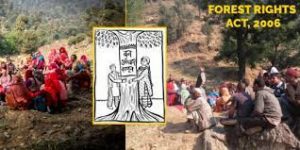
The Himachal Pradesh government has said that it settled 164 claims filed under Section 3(1) and 1,811 cases filed under Section 3(2) of the Forests Rights Act (FRA), 2006.
- The Act passed in 2006 grants legal recognition to the rights of traditional forest dwelling communities.
Rights under the Act:
- Title rights – i.e. ownership – to land that is being farmed by tribals or forest dwellers as on 13 December 2005, subject to a maximum of 4 hectares; ownership is only for land that is actually being cultivated by the concerned family as on that date, meaning that no new lands are granted.
- Use rights – to minor forest produce (also including ownership), to grazing areas, to pastoralist routes, etc.
- Relief and development rights – to rehabilitation in case of illegal eviction or forced displacement; and to basic amenities, subject to restrictions for forest protection.
- Forest management rights – to protect forests and wildlife.
- According to Section 2(c) of Forest Rights Act (FRA), to qualify as Forest Dwelling Scheduled Tribe (FDST) and be eligible for recognition of rights under FRA, three conditions must be satisfied by the applicant/s, who could be “members or community”:
- Must be a Scheduled Tribe in the area where the right is claimed; and
- Primarily resided in forest or forests land prior to 13-12-2005; and
- Depend on the forest or forests land for bonafide livelihood needs.
- And to qualify as Other Traditional Forest Dweller (OTFD) and be eligible for recognition of rights under FRA, two conditions need to be fulfilled:
- Primarily resided in forest or forests land for three generations (75 years) prior to 13-12-2005.
- Depend on the forest or forests land for bonafide livelihood needs.
NATO Membership:
Finland and Sweden have dismissed Russia’s warnings that their potential NATO membership would have “serious military-political consequences” for the two countries.
- Russia has put forth two draft agreements that seek explicit, legally binding security guarantees from the United States and NATO, respectively:
- The draft calls for NATO to end its eastward expansion, specifically, deny future membership to ex-Soviet states, such as Ukraine.
- It would also ban the United States from establishing bases in or cooperating militarily with former Soviet states.
- It would block both signatories from deploying military assets in areas outside their national borders that “could be perceived by the other party as a threat to its national security.”
- However, Russia has voiced concern about what it described as efforts by the United States and some of its allies to “drag” Finland and Sweden into NATO and warned that Moscow would be forced to take retaliatory measures if they join the alliance.
- Tensions between Russia and the West have been building ever since Vladimir Putin started his proxy war in eastern Ukraine and annexed Crimea.
- In response, NATO sent reinforcements to countries seen as vulnerable to Russian aggression.
- In December, Moscow set out its security demands in two documents: a proposed treaty with the US, and an agreement with NATO.
- Essentially, Russia now wants guarantees that NATO will halt its eastward expansion, rule out membership for Ukraine and other former Soviet countries, and roll back its military deployments in Central and Eastern Europe.
- Russian leaders have long been wary of the eastward expansion of NATO, particularly as the alliance opened its doors to former Warsaw Pact states and ex-Soviet republics in the late 1990s (the Czech Republic, Hungary, and Poland) and early 2000s (Bulgaria, Estonia, Latvia, Lithuania, Romania, Slovakia, and Slovenia).
- Their fears grew in the late 2000s as the alliance stated its intent to admit Georgia and Ukraine at an unspecified point in the future.
Bhakra Beas Management Board (BBMB):
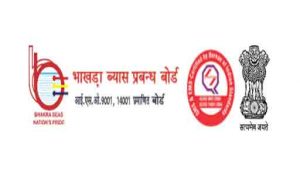
The Union Power Ministry has made an amendment to the rules governing the appointment of Member Power and Member Irrigation on Bhakra Beas Management Board (BBMB) from Punjab and Haryana, respectively, thereby removing the stipulation that these two appointments need to be filled from the two states only.
- Posts of Member Power and Member Irrigation have so far been occupied by officials from Punjab & Haryana, respectively.
Under the new rules notified by the Ministry of Power, officials from other states are now eligible. - The two members are appointed by the central government after selection from a panel of engineers forwarded to the Ministry of Power by the respective states.
- Change in the rules has kicked up a controversy, with a section of stakeholders averring the new criteria makes it difficult for aspirants from Punjab to get selected.
- It is also being averred by some employees of the Board that since the organisation is dealing with water management in the aforementioned states, full-time members ought to be drawn from these states as they will have a better understanding of local issues and technicalities.
- Following the reorganisation of Punjab in 1966, Punjab and Haryana were allocated a share of 58:42 in power projects related to BBMB. Later, Rajasthan, Himachal Pradesh and Chandigarh were also given a share.
Bhakra Beas Management Board:
- On Reorganisation of the erstwhile state of Punjab on 1st November, 1966, Bhakra Management Board (BMB) was constituted under section 79 of the Punjab Reorganisation Act, 1966.
- The administration, maintenance and operation of Bhakra Nangal Project were handed over to Bhakra Management Board w.e.f. 1st October 1967.
- The Beas Project Works, on completion, were transferred by Government of India from Beas Construction Board (BCB) to Bhakra Management Board as per the provisions of Section 80 of the Punjab Reorganisation Act, 1966.
- Pursuant to this Bhakra Management Board was renamed as Bhakra Beas Management Board (BBMB)e.f. 15th May 1976.
- Since then, the Bhakra Beas Management Board is dedicated to the service of the nation and is engaged in regulation of the supply of Water & Power from Bhakra Nangal and Beas Projects to the states of Punjab, Haryana, Rajasthan, Himachal Pradesh, Delhi and Chandigarh.
- It is a statutory body.
The Bhakra-Nangal dam is one of the earliest river valley development schemes undertaken after the independence of India.
- The project was signed by then Punjab Revenue Minister Sir Chhotu Ram in November 1944 with the king of Bilaspur and was finalised on January 8, 1945.
- The construction of the multipurpose dam was initially started by the then Lieutenant Governor of Punjab, Sir Louis Dane.
- But, it got delayed and it was resumed after independence under the chief Architect Rai Bahadur Kunwar Sen Gupta.
- The dam was completed in 1963, and it was dedicated to the nation by Prime Minister Jawaharlal Nehru.
- The Bhakra dam is built on Sutlej River.
- It is Asia’s second tallest dam with a height of around 207.26 meters after the Tehri dam, which has a height of around 261 meters.
- The Tehri dam is also situated in India in the state of Uttrakhand.




